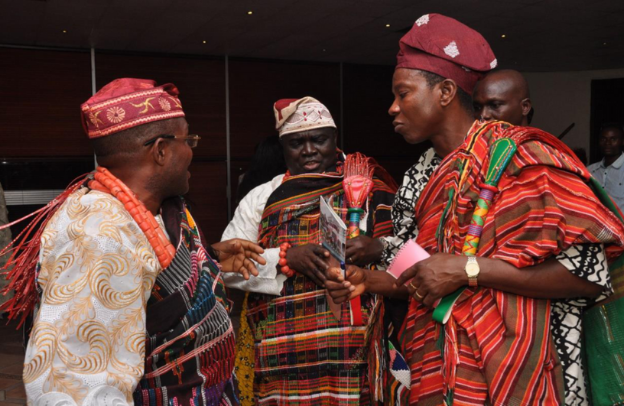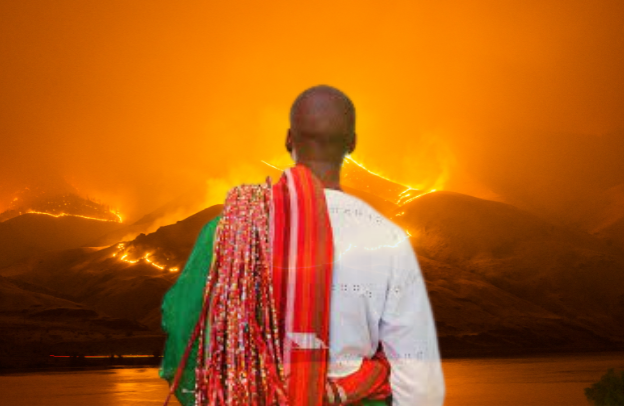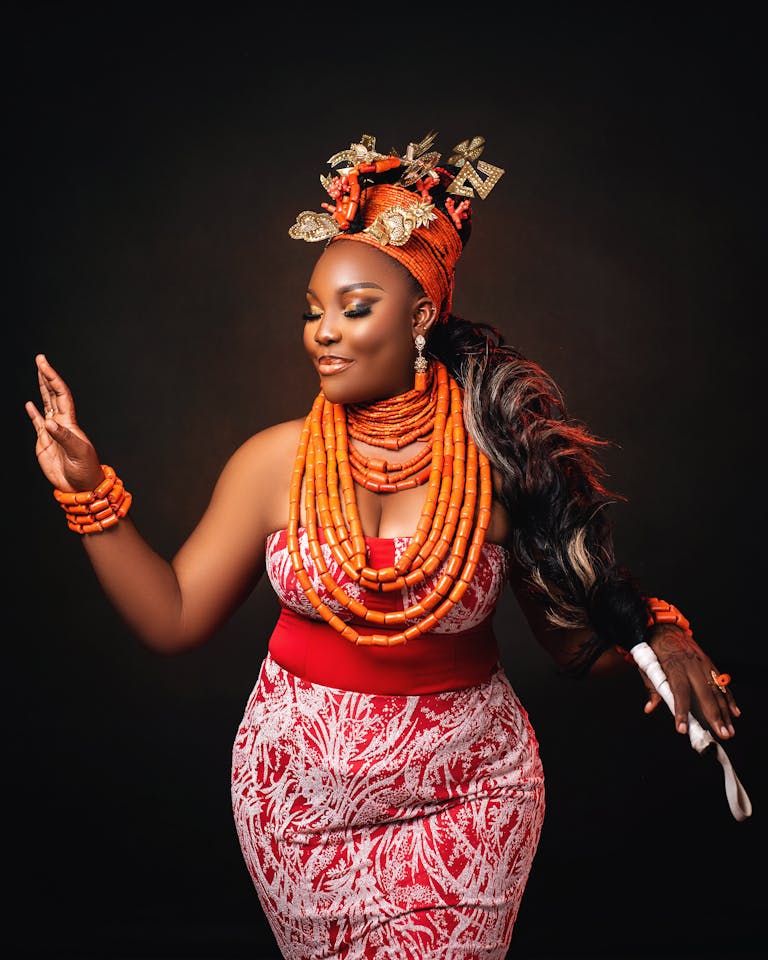The Esan Ibhiaba: Finding The Extended Self For Purpose-Driven Entrepreneurs

As an entrepreneur or purpose-driven professional, it’s easy to feel like you’re going at it alone. The pressures of decision-making, financial uncertainty, and constant adaptation can make you feel isolated. But what if you could draw strength from something bigger than yourself? What if your sense of identity and purpose could be expanded by a connection to your community, your ancestry, and a tradition that has stood the test of time?
Want to learn more about storytelling? Start by downloading the first chapter of The Storytelling Mastery.
I grew up in Amedokhian, Uromi, Nigeria, where life was organized around simple yet profound principles. Now, living in Italy and having had the opportunity to interview different scholars from around the world, through my podcasting and research projects, I have come to appreciate even more the way of life of the Esan people, where I first learned the foundational principles of community and interconnectedness.
Concepts like communal work, the spirit of collective existence, and a shared destiny were all seamlessly woven into everyday life, leaving a lasting impression on me. Today, I want to share one of these guiding principles—the Esan Ibhiaba, or the concept of the Extended Self—with you, in the hope that you too can learn from it and apply it in your professional and business endeavors.
The Esan concept of Ibhiaba provides a compelling model for how you can discover and embody an “Extended Self”—a self that thrives not just on personal ambition, but on the collective strength and wisdom of your community.
You might also like The British Colonial Invasion Of Uromi in 1901 (Agba: The Esan God Of War, 4)
During this conversation, we will consider various aspects of the concept and how to apply it in your life. We will examine a few publications in support of the concept, how it can be useful in building your extended self in a modern world, its relevance within your business area, and its spiritual significance. So, sit back and enjoy the reading.
Community as Strength: The Lesson of Ibhiaba
In Esan culture, Ibhiaba (or Obhiaba in its singular form) is more than just a family unit; it’s the foundational structure that supports social, political, and economic life. As described in Esan tradition, the word Ibhiaba combines “Obhio,” meaning brother, and “Aba,” which stands for father.
The concept extends beyond the immediate nuclear family to encompass the broader lineage, especially on the male side. Here, the idea of brotherhood extends to include all male descendants of a common ancestor, forming a collective that shares not only a bloodline but also responsibilities, support, and wisdom.
This structure teaches a powerful lesson for today’s professionals: your community can be your greatest strength.
When you see yourself as part of a larger whole, you gain access to shared resources, insights, and support that you might never find on your own. Just as the elders in an Esan Ibhiaba gather the younger members, resolve conflicts, and uphold traditions, you too can draw on the wisdom and experience of those who have come before you.
See also The Concept Of Ehi and Spirituality Among the Esan People of Nigeria
This isn’t just about familial ties; it’s about recognizing that your success is intertwined with the success of those around you.
For example, consider how mentorship and peer networks function in the professional world.
When you engage in communities such as professional associations, industry groups, or even informal mentorship circles, you are building your own version of an Ibhiaba like in Esan land. This can also be highly valuable within the African diaspora community where people are always looking for African indigenous ideas that hold them together in building a deeper connection among them.
Through the principle of Ibhiaba, you are connecting with others who share your values and goals, and who can offer guidance based on their own experiences. This sense of shared purpose not only bolsters your resolve during tough times but also provides new perspectives that can lead to breakthrough ideas.
The Concept Of The Extended Self As Explained By Wade W. Nobles
Recently, I read an interesting article, titled “Extended Self: Rethinking the So-Called Negro Self-Concept” and I think it makes a lot of sense in what we are talking about today. Let’s explore it a bit and here is the link if you want to read the full document.
The publication by Wade W. Nobles explores the concept of the Extended Self within the context of African and African American identities, critiquing Western psychological frameworks for their role in reinforcing colonialist ideologies.
Nobles argues that the Western approach to psychology often imposes a sense of individuality and separation that conflicts with African worldviews, which emphasize collective identity and interconnectedness.
See also Connecting with Your Tribe: Using Storytelling to Cultivate a Loyal Community
This notion of the Extended Self perfectly aligns with the Esan concept of Ibhiaba, where identity is not confined to the individual but is deeply rooted in the family and community.
The Ibhiaba represents a similar collective consciousness that strengthens personal and communal bonds, fostering a sense of belonging and shared purpose.
Nobles’ critique highlights how Western psychology’s focus on individualism contrasts sharply with African principles that prioritize communal relationships and the continuity of the group over the individual.
This reflects the Ibhiaba‘s emphasis on patrilineal descent and collective governance, where each member’s identity and role are defined by their relationship to the whole.
Both perspectives suggest that understanding oneself requires recognizing one’s place within a broader social and historical context, advocating for a reconceptualization of self that embraces community and shared heritage.
This extended self-concept can empower individuals by connecting them to a lineage of strength, wisdom, and collective resilience, much like the elders within Ibhiaba who guide and support their community.
Beyond Self-Imposed Limitations
In the business world, it’s easy to become trapped by your own perceived limitations. You might believe that you don’t have the right skills, the right connections, or the right timing to succeed.
However, when you understand yourself as part of a larger community—as part of an Extended Self—you can begin to see beyond these constraints.
See also Address to the Community of Orlando, Florida, After Meeting Privately with Families of the Victims
In the function of the Ibhiaba group in Esan culture, the elders are often seen as the custodians of knowledge and tradition, and they play a crucial role in conflict resolution and community decision-making.
This role isn’t just a function of age; it’s about the accumulation of experience and the ability to see beyond individual challenges to the collective good. When you adopt this perspective, you too can start to view obstacles not as insurmountable barriers but as challenges to be overcome with the support and insight of your community.
Take, for instance, the story of Ngozi Okonjo-Iweala, the first woman and first African to become the Director-General of the World Trade Organization. Okonjo-Iweala has often spoken about the importance of community and mentorship in her career.
Her journey was not just about her individual brilliance but also about the mentors who guided her, the communities that supported her, and the ancestral values that grounded her.
See also Seven African Lessons About Self-Preservation
She represents a modern embodiment of the Ibhiaba spirit, drawing strength from both her immediate network and her broader cultural heritage.
When you see yourself as part of an Extended Self, you start to ask different questions:
- “How can I use my skills to benefit my community?” or
- “What can I learn from others who have faced similar challenges?”
These questions open new pathways for growth and collaboration that go beyond the self-imposed limitations of “I can’t” or “I’m not enough.”
Collective Decision-Making and Leadership
The Ibhiaba model also offers valuable lessons in leadership and decision-making. In traditional Esan society, decisions are made collectively, often in assemblies of elders who represent the different Ibhiaba which forms the village assembly.
This process ensures that all voices are heard and that decisions are made in the best interest of the entire community, not just a select few.
For modern professionals, this approach can transform how you lead your team or organization. I can understand that in today’s fast-paced world, it’s tempting to make quick, unilateral decisions to maintain momentum.
However, the idea of Ibhiaba teaches the value of patience, dialogue, and inclusivity. By involving others in the decision-making process, you not only make more informed choices but also foster a sense of ownership and commitment among your team members.
Consider the example of Ubuntu, a South African philosophy often translated as “I am because we are.” This concept is closely aligned with the idea of the Extended Self and has been a guiding principle for leaders like Nelson Mandela and Desmond Tutu.
See also Uromi And The Spirit Of Ubuntu By Austin Isikhuemen
Ubuntu emphasizes the importance of mutual respect, shared goals, and collective well-being—principles that are also central to Ibhiaba in Esan culture. When you lead with an Ubuntu mindset, you prioritize the health and success of the group over individual accolades, which in turn builds a stronger, more resilient organization.
Moreover, collective decision-making doesn’t mean compromising on quality or innovation. On the contrary, when diverse perspectives are brought to the table, you are more likely to identify creative solutions and avoid potential pitfalls.
See also Tips To Be Creative In Business
Just as the Ibhiaba brings together different branches of the same family to find consensus, you can cultivate a culture of collaboration in your workplace that harnesses the best ideas from all team members.
Building Your Extended Self in a Modern World
So, how can you apply these lessons from the Ibhiaba to your own life and career? The first step is to embrace your ancestry and community.
This doesn’t mean you need to have a direct connection to Esan culture or any specific tradition in Africa. Rather, it’s about recognizing that your identity is shaped by a complex web of relationships, histories, and shared experiences.
By exploring these connections, you can build a more holistic understanding of who you are and what you have to offer.
Start by researching your own lineage. Learn about the values, stories, and struggles of your ancestors. What challenges did they face, and how did they overcome them?
What values did they hold dear, and how can those values inform your own life and work? By connecting with your roots, you not only honor your heritage but also gain a deeper appreciation for the strengths and resilience that have been passed down to you.
Next, engage with your community. This could mean participating in cultural events, joining professional networks, or simply reaching out to others who share your interests and goals.
See also How To Set Effective Goals – Goal Setting Series
The key is to build relationships based on mutual respect and shared purpose. Just as the Esan Ibhiaba relies on the collective wisdom of its members, you can create a network of support and inspiration that helps you navigate the challenges of your professional journey.
Finally, cultivate a mindset of collective leadership. Whether you are leading a team, managing a project, or building a business, strive to make decisions that reflect the best interests of the group, not just your own.
Encourage open dialogue, seek out diverse perspectives, and be willing to adapt and learn from others. By doing so, you not only become a more effective leader but also build a stronger, more cohesive team that is capable of achieving great things together. But what about a spiritual angel in the conversation? Now, let’s explore that.
The Concept Of Ibhiaba And Spiritual Importance
The Esan Ibhiaba holds deep spiritual significance in the community as it embodies the principles of unity, continuity, and ancestral reverence. In Esan culture, the Ibhiaba is more than just an extended family; it is a spiritual construct that links individuals to their ancestors and to one another, forming a sacred web of relationships that transcends time.
See also Religion And Spirituality in Ancient Kemet with Dr. Kiatezua Lubanzadio Luyaluka
Because of their role, in terms of conflict resolution, and preserving family history and tradition, the Ibhiaba not only preserves family lineage but also maintains a living connection to the spiritual realm, where ancestors are believed to play an active role in the lives of their descendants.
Through rituals, ceremonies, and communal gatherings, the Ibhiaba serves as a conduit for ancestral blessings, ensuring the prosperity, protection, and spiritual guidance of its members.
This connection is reinforced through practices such as libations, family rites, and prayers, which honor the ancestors and invoke their presence and support in communal affairs.
Beyond its role in connecting the living to their ancestors, the Esan Ibhiaba is vital for fostering a collective spiritual identity within the community. It instills a sense of belonging and shared purpose among its members, promoting values such as cooperation, respect, and mutual support.
See also The Esan War Machine and the Foundation of Eko Lagos, Nigeria (Agba: The Esan God Of War, 3)
In times of conflict or crisis, the Ibhiaba acts as a stabilizing force, providing spiritual counsel and mediating disputes through a framework of kinship and moral obligation. This reinforces the belief that the well-being of the individual is intrinsically tied to the well-being of the community, aligning personal actions with collective values.
The spiritual importance of the Ibhiaba thus lies in its ability to sustain the social fabric of the Esan people by intertwining spiritual beliefs with everyday life, making the Ibhiaba a cornerstone of both spiritual and communal health.
Real-Life Applications: Bringing Ibhiaba into Your Business Practices
The principles of Ibhiaba are not just theoretical; they can be directly applied to how you run your business or lead your team. For instance, consider how you can incorporate community-oriented practices into your organizational culture.
This might involve setting up regular team meetings where everyone is encouraged to share their ideas and feedback, much like the kindred assemblies in Esan culture.
It could also mean creating mentorship programs that mirror the guidance provided by the elders of the Ibhiaba, ensuring that knowledge and experience are passed down through the ranks.
Furthermore, look for ways to embed a sense of collective purpose into your company’s mission and values. This could involve focusing on social impact, such as supporting local communities or promoting sustainable practices.
See also Know Your Life Mission and Future Aspiration: Owning Your Story for a Deeper Purpose, Pt. 4
By aligning your business objectives with the well-being of a broader community, you create a sense of purpose that goes beyond profit and fosters a deeper connection among your team members.
For example, consider companies like Ben & Jerry’s, which have long prioritized social and environmental responsibility as part of their core mission. Their commitment to collective well-being has not only differentiated them in the market but also created a loyal customer base and a motivated workforce.
By taking a similar approach, you can build a business that stands out not just for its products or services but for its values and impact.
Conclusion: Reclaiming the Extended Self for a Purpose-Driven Life
The concept of the Extended Self, as exemplified by the Esan Ibhiaba, offers a powerful framework for today’s entrepreneurs and professionals. By seeing yourself as part of a larger community, you gain access to a wealth of resources, support, and wisdom that can help you navigate the challenges of your career.
More importantly, you discover a deeper sense of purpose and fulfillment that comes from contributing to something bigger than yourself.
See also The Why Behind the Mission – Owning Your Story for a Deeper Purpose, Pt. 1
So, as you continue on your professional journey, remember the lessons of the Ibhiaba. Embrace your community, draw on the wisdom of those who have come before you, and lead with a spirit of inclusivity and collaboration.
By doing so, you not only enhance your own potential but also contribute to the success and well-being of those around you.
Want to learn more about storytelling? Start by downloading the first chapter of The Storytelling Mastery.





